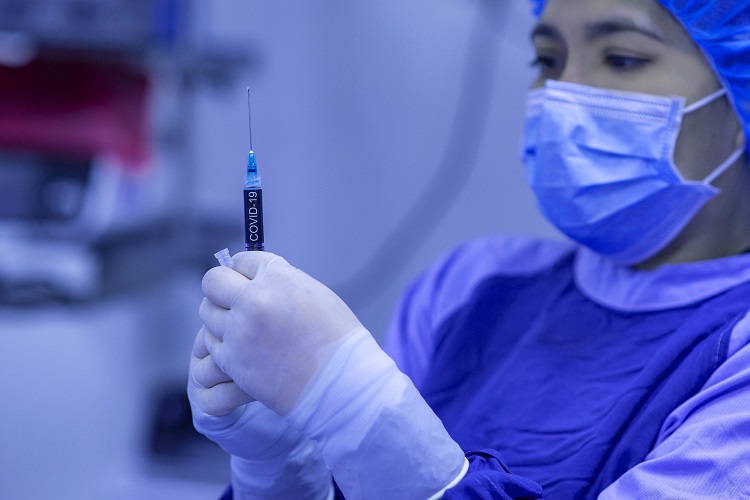Vaccination works but a small number are still at increased risk

Men are more at risk of experiencing a severe complication from the Covid-19 virus than women even after vaccination, although the risk is low with only 0.07 per cent of partially vaccinated and 0.006 per cent of fully vaccinated people suffering a serious case of the virus, according to the first national study (Scotland) on Covid-19 outcomes after vaccination by a UK-wide consortium of researchers, including the University of St Andrews.
The research, published in medical journal The Lancet Respiratory Medicine (Tuesday 28 September), found that fewer than one in 2000 partially vaccinated people and fewer than one in 10,000 fully vaccinated people in Scotland suffered a serious case of Covid-19 (hospitalisations and deaths) between December 2020 and April 2021 when there were high background levels of infection.
The study, which also included researchers at the Universities of Aberdeen, Glasgow, Edinburgh and Strathclyde and Public Health Scotland, found that although the risk for men was around 25 per cent higher than that for women, those aged in their 80s were five times at greater risk than those aged 18-64, and those with multiple underlying health conditions, those admitted to hospital in the previous four weeks, those with a high risk occupation, living in a care home or a deprived area were also at greater risk even after having received both doses of a vaccine.
Dr Utkarsh Agrawal of the School of Medicine at the University of St Andrews, a lead author on the paper, said: “Our research has identified that there are some groups who remain at greater risk of severe complications from the Covid-19 virus even after vaccination.
“However, the vaccination programme has lowered that risk significantly with only 0.006 per cent of people who have had both vaccinations suffering a severe complication from the virus.”
Professor Aziz Sheikh, Director of the University of Edinburgh’s Usher Institute and EAVE II* study lead, said: “No vaccine is 100 per cent effective. These data, from our national analysis of over 2.5 million Covid-19 vaccines, show that the risk of developing severe Covid-19 leading to hospital admission or death after at least one vaccination was – thankfully – very low. Based on this analysis, we would encourage anyone who has not yet been vaccinated to take up the offer as soon as possible.
“By identifying the characteristics of those most at risk of serious Covid-19 outcomes after vaccination, clinicians will, we hope, be better informed about which patients may require particularly close monitoring if they develop Covid-19.”
A severe case of Covid-19 is defined as one involving hospitalisation or death within 28 days of a positive test or with Covid-19 recorded as the reason for admission to hospital.
The Covid-19 vaccination programme in Scotland began on 8 December 2020 with the Pfizer-BioNTech vaccine. This was then followed by the Oxford-AstraZeneca vaccine from 4 January 2021 after approval from the Medicines and Healthcare products Regulatory Agency (MHRA).
Of the 2.57 million adults who had received the first dose of a vaccine, only 883 were admitted to hospital with Covid-19 and 541 died within the period studied.
Nearly 700,000 people received their second vaccine in this period – 27 per cent of those included in the study with just 39 of those (0.006 per cent) suffering a serious case of Covid-19.
The study also found that having had Covid-19 before receiving a vaccine reduced the risk of serious Covid-19 even further.
The authors report that taking age, sex and level of social deprivation into account, people with a history of asthma, chronic kidney disease, heart failure, type 2 diabetes, dementia and coronary heart disease were at increased risk of serious Covid-19 after a vaccination.
The team will now continue to analyse the outcomes for those who have suffered a serious case of Covid-19 following second and, in eligible individuals, booster vaccine doses.
They also plan to extend this work from the focus on Pfizer-BioNTech and Oxford-AstraZeneca in this analysis to other vaccines such as Moderna, which are now beginning to be administered at scale.
Finally, they also plan to investigate outcomes in children and young people who are now eligible for Covid-19 vaccinations.
*The study used data from the Early Pandemic Evaluation and Enhanced Surveillance of Covid-19 (EAVE II) which was funded by UK Research and Innovation (Medical Research Council); Research and Innovation Industrial Strategy Challenge Fund; the Scottish Government; the National Institute for Health Research (NIHR); and Health Data Research UK.
The paper COVID-19 hospital admissions and deaths post BNT162b2 and ChAdOx1 vaccinations: National prospective cohort study of 2.57 million people in Scotland is published in The Lancet Respiratory Medicine and is available online.
Please ensure that the paper’s DOI (doi.org/10.1016/S2213-2600(21)00380-5) is included in all online stories and social media posts and that The Lancet Respiratory Medicine is credited as the source.
NIHR is funded by the Department of Health and Social Care. Its work in low and middle income countries is principally funded through UK Aid from the UK government. The mission of the National Institute for Health Research (NIHR) is to improve the health and wealth of the nation through research by:
- Funding high quality, timely research that benefits the NHS, public health and social care
- Investing in world-class expertise, facilities and a skilled delivery workforce to translate discoveries into improved treatments and services
- Partnering with patients, service users, carers and communities, improving the relevance, quality and impact of their research
- Attracting, training and supporting the best researchers to tackle complex health and social care challenges
- Collaborating with other public funders, charities and industry to help shape a cohesive and globally competitive research system
- Funding applied global health research and training to meet the needs of the poorest people in low and middle income countries.
Issued by the University of St Andrews Communications Office.